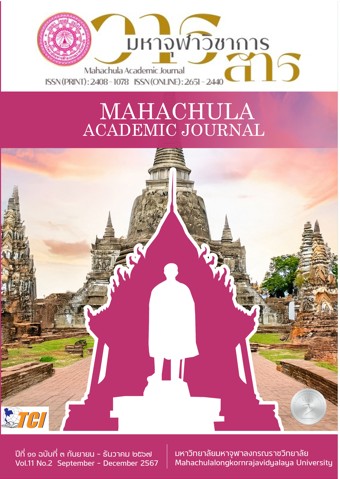THE DEVELOPMENT OF FUNDAMENTAL THINKING SKILLS FOR 3 nd GRADE - PRESCHOOL LEARNING THROUGH MONTESSORI CONCEPT -
Main Article Content
Abstract
Abstract
The objectives of this research were: (1) to compare the Fundamental Thinking Skills in learning before and after of Kindergarten 3 students by arranging learning experiences based on Montessori approach, (2) to study the development of Fundamental Thinking Skills in learning of Kindergarten 3 students arranging learning experiences based on Montessori approach, and (3) to study the satisfaction of Kindergarten 3 students in receiving arranged learning experiences based on Montessori approach. This study was experimental research. The sample group used in the research was 29 Kindergarten 3/2 students from Wat Bangluang School, Bang Len District, Nakhon Pathom Province, in the first semester of the 2023 academic year obtained through cluster random sampling using classrooms as sampling units. The research instruments included lesson plans of arranging learning experiences based on the Montessori approach for Kindergarten 3 students, a test of basic thinking skill in learning of Kindergarten 3 students, an assessment of basic thinking skill in learning, and a questionnaire on satisfaction with arranged learning experiences based on the Montessori approach. The data analysis used percentage (%), mean (X), standard deviation (S.D.), and t – test dependent.
The research results found that: (1) Kindergarten 3 students who received learning experience arrangement based on the Montessori approach had significantly higher Fundamental Thinking Skills in learning at the .05 level after receiving the learning experience arrangement compared to before. (2) Kindergarten 3 students who received learning experience arrangement based on the Montessori approach had developed basic thinking skill in learning after receiving the learning experience arrangement based on the Montessori approach. (3) Kindergarten 3 students who received learning experience arrangement based on the Montessori approach had a high level of average satisfaction with the learning experience arrangement based on the Montessori approach
Keywords: Montessori Approach; Fundamental Thinking Skills in learning
Article Details

This work is licensed under a Creative Commons Attribution-NonCommercial-NoDerivatives 4.0 International License.
References
บรรณานุกรม
กระทรวงศึกษาธิการ. หลักสูตรการศึกษาปฐมวัย พุทธศักราช ๒๕๖๐. กรุงเทพฯ:๒๕๖๐
กุลยา ตันติผลาชีวะ. รูปแบบการการสอนปฐมวัยศึกษา. กรุงเทพฯ: เบรน –เบส บุ๊ค, ๒๕๕๑.
พัทธนิตย์ คุ้มครอง. การพัฒนาความสามารถในการแก้ปัญหาของเด็กปฐมวัยโดยใช้การจัดประสบการณ์
ตามรูปแบบมอนเตสซอรี่. วิทยานิพนธ์สาขาวิชาหลักสูตรและการสอน. (กรุงเทพฯ: มหาวิทยาลัย
ธุรกิจบัณฑิต,๒๕๖๐).
มุนินทร์ นวลเนตร และคณะ. การพัฒนาทักษะการคิดวิเคราะห์ของเด็กปฐมวัยอายุ ๕ - ๖ ปี ด้วยการ
จัดประสบการณ์แบบมอนเตสซอรี. วารสาร มจร อุบลปริทรรศน์. ปีที่ ๖ ฉบับที่ ๒
พฤษภาคม-สิงหาคม ๒๕๖๔ .๒๒๙-๒๙๙.
เยาวพา เตชะคุปต์. กิจกรรมสำหรับเด็กปฐมวัย. กรุงเทพ ฯ : เอพี กราฟฟิกส์ ดีไซน์, ๒๕๔๒.
โรงเรียนวัดบางหลวง. รายงานการประชุมพัฒนาการเรียนรู้ทางวิชาชีพ (PLC) ของคณะครูปฐมวัยโรงเรียน
วัดบางหลวง. นครปฐม: โรงเรียนวัดบางหลวง, ๒๕๖๔.
สิริมา ภิญโญอนันตพงษ์. การศึกษาปฐมวัย. กรุงเทพฯ: มหาวิทยาลัยราชภัฏสวนดุสิต, ๒๕๕๐.
สำนักงานเลขาธิการสภาการศึกษา. แผนการศึกษาแห่งชาติ พ.ศ. ๒๕๖๐– ๒๕๗๙ กรุงเทพฯ:
พริกหวานกราฟฟิคจำกัด, ๒๕๖๐.
________. แนวทางการจัดประสบการณ์การเรียนรู้ที่หลากหลายในสถานพัฒนาเด็กปฐมวัยตามบริบทไทย
: แนวทางการจัดประสบการณ์การเรียนรู้แบบมอนเตสซอรี่ (Montessori Approach).
นนทบุรี: บริษัท ๒๑ เซ็นจูรี่ จำกัด,๒๕๖๕.
สำนักบริหารงานการศึกษาภาคบังคับ สำนักงานคณะกรรมการการศึกษาขั้นพื้นฐานกระทรวงศึกษาธิการ.
คู่มือการจัดประสบการณ์ระดับปฐมวัยตามแนวคิดมอนเตสซอรี ในบริบทสพฐ. เล่ม ๑ รู้และเข้าใจมอนเตสซอรี : ทฤษฎีสู่การปฏิบัติ. กรุงเทพฯ: โรงพิมพ์ชุมนุมสหกรณ์การเกษตรแห่งประเทศไทย
จำกัด, ๒๕๕๘.
อรุณี หรดาล. หน่วยที่ ๒ แนวการจัดประสบการณ์เพื่อพัฒนาเด็กปฐมวัย ใน ประมวลสาระชุดวิชา
การจัดประสบการณ์สำหรับเด็กปฐมวัย. หน่วยที่ ๑-๖. (พิมพ์ครั้งที่ ๑).นนทบุรี: สาขาวิชา
ศึกษาศาสตร์ มหาวิทยาลัยสุโขทัยธรรมาธิราช, ๒๕๔๘.
Carey, K. What Montessori Says. Montessori Life, Spring, 2012. pp. 5-6.
Kayili, G., & Ari, R. The Determination of Effect of Montesssori Method On preschool
Children’s Primary School Readiness. Journal of Theory and Practise in Education,
Educational Sciences: Theory & Practice, 11, 2011, pp 2091-2109.
Mckenzie, K. G. and Zascavage, Z. V. Montessori Instruction: A Model for Inclusion in
Early Childhood Classrooms. Montessori Life, Spring, 2012, pp. 32-38.


